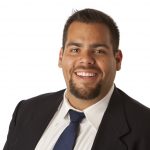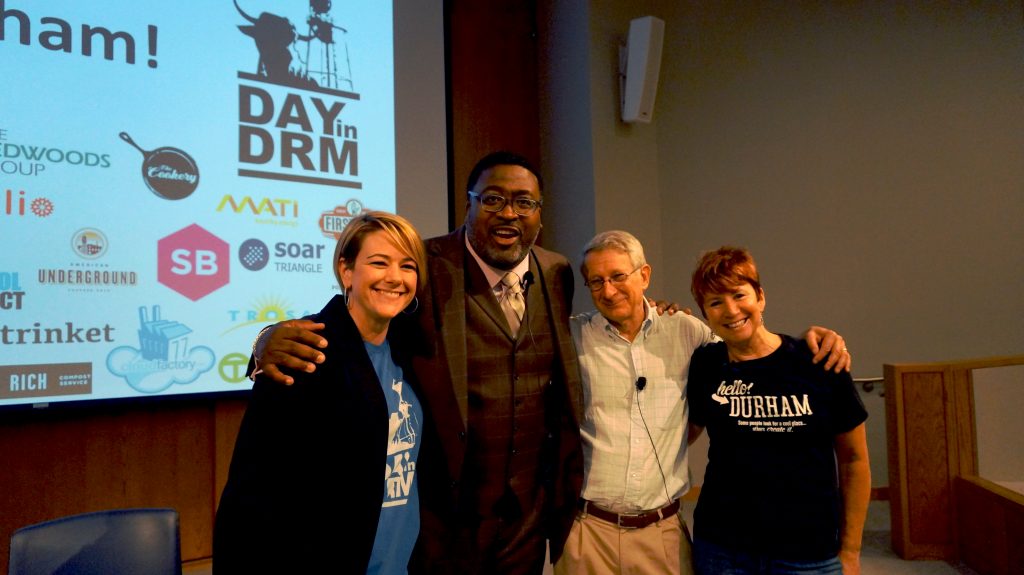 This post was written by Jonathan Woodward, a 2019 Fuqua MBA and a CASE Scholar. Before coming to Fuqua, Jonathan worked on educational programs in Los Angeles, including the teaching policy advocacy group Teach Plus and Alliance College-Ready Public Schools. Learn more about Jonathan here.
This post was written by Jonathan Woodward, a 2019 Fuqua MBA and a CASE Scholar. Before coming to Fuqua, Jonathan worked on educational programs in Los Angeles, including the teaching policy advocacy group Teach Plus and Alliance College-Ready Public Schools. Learn more about Jonathan here.
My time at Fuqua started off with a bang, literally! At the beginning of orientation, each section was tasked with creating a cheer and making as much noise as possible. Some sections got creative with their noisemakers (e.g. old tubas, empty buckets, fog-horns, etc.)—it was impressive. The energy in the room when every section was firing on all cylinders was palpable and contagious. After three days, I had lost my voice but found a first-place victory in the Section Olympics!
Global Institute (GI) was both exciting and exhausting. In no time I was taking mid-terms, building houses with Habitat for Humanity, meeting new friends, YES-Anding, climbing over a 14 ft wall…with a little help from my friends, and getting to know my incredible classmates. Needless to say, it was a very enriching experience. While I was lucky to partake in several invaluable experiences during GI, none was as rewarding as Day in Durham.
Excitement for Day in Durham started well before orientation and GI. For many of us, it wasn’t a question of if we were going to participate in Day in Durham but rather which experiential track we would sign up for (e.g. social entrepreneurship, sustainable cities, tech for good, etc.). Day in Durham came at a great time. Most of the activities up until that point had been focused on academics, team-building, and the social side of Fuqua. Day in Durham helped remind me and my classmates of how lucky we all are to be living in the amazing City of Durham.

On the day of the event I was excited to see so many of my classmates – on a Saturday morning no less! Day in Durham was kicked off by a welcome from Erin Worsham, Executive Director for the Center for the Advancement of Social Entrepreneurship (CASE). Erin shared more about CASE, why she loves living in Durham, and some illuminating statistics about the city to provide context for the day to come. Next, we heard from three Durham mayoral candidates. Each candidate provided a key insight into the history of Durham as well as their own perspective as to why we are so lucky to be living and learning in the city. Leaving Geneen Auditorium, I had a newfound appreciation for the City of Durham and I was thrilled to have the opportunity to learn more about some of the amazing organizations that operate in the city.
My wife, Amanda, and I headed to the meeting area where we boarded the bus for the social entrepreneurship focus group. The bus we rode was fully powered by vegetable oil—so cool! After a short ride, we arrived at the Triangle Residential Options for Substance Abusers, Inc. (TROSA) and we were welcomed by a resident of the program. I was immediately struck by how beautiful and well-kept the facility was.
Our group of about 30 students were directed to a large conference room where we were met by a Fuqua alumnus. The alumnus and his colleagues gave our group an overview of TROSA, their mission and how they think about rehabilitation. Unlike many other nonprofits, TROSA operates a self-sustaining business model, meaning that they run businesses (e.g. thrift stores, moving companies, etc.) that make a profit to help sustain their operations and impact. We were taken on a tour of the facility where we met residents and TROSA employees. Residents shared incredible stories of rehabilitation and explained how TROSA gave them another shot at life. Residents in the program are expected to work in one of the many TROSA businesses (e.g. lawn care, automotive, etc.) and they shared with us how the structure of the program and task significance of their work provided them with a lot of pride and meaning.
We ended our day at TROSA with a panel discussion featuring local social entrepreneurship leaders, including Jeff Stern, Director of Business Operations at TROSA; Dan Norber, VP of Consulting with The Redwoods Group Foundation; Cicely Mitchell, President and Co-Founder of The Art of Cool; and Geraud Staton, Executive Director and Founder of the Helius Foundation.
We heard from each of the speakers about their theory for change as well as how they saw business playing a role in making a positive impact on the world and specifically on the communities in Durham. Each panelist also shared some advice as to how we might begin crafting our theory for change and the unique way we would like to make an impact while at Fuqua and beyond.
When our time at TROSA came to an end and we boarded our bus back to Fuqua, I took a moment to reflect on how lucky I am to be a part of this amazing community at Fuqua. What Day in Durham did for me, and I suspect did the same for many others, was to remind us of the bigger picture outside of Fuqua.
Business school is a two-year, focused effort on personal development and growth. Day In Durham will be a constant reminder to me that my own growth and development should be in service to a larger goal to create meaningful impact in the world beyond Fuqua.
